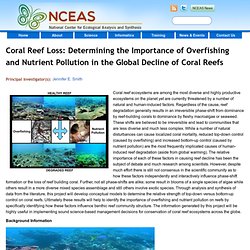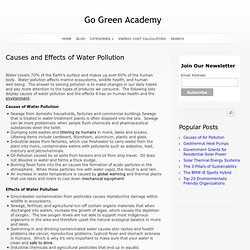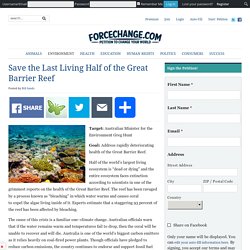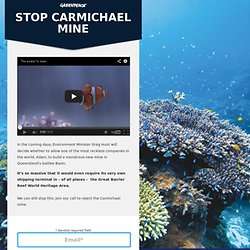Zoom
Trash

Major observed threats to world's coral reefs. Coral Reef Loss: Determining the Importance of Overfishing and Nutrient Pollution in the Global Decline of Coral Reefs. Coral reef ecosystems are among the most diverse and highly productive ecosystems on the planet yet are currently threatened by a number of natural and human-induced factors.

Regardless of the cause, reef degradation generally results in an irreversible phase-shift from dominance by reef-building corals to dominance by fleshy macroalgae or seaweed. These shifts are believed to be irreversible and lead to communities that are less diverse and much less complex. While a number of natural disturbances can cause localized coral mortality, reduced top-down control (caused by overfishing) and increased bottom-up control (caused by nutrient pollution) are the most frequently implicated causes of human-induced reef degradation (aside from global warming).
Overfishing and destructive fishing. Coral bleaching. These aerials of Australia's Great Barrier Reef are evidence the most untouched part of it has the most severe bleaching in its history.

The footage, which filmed over 500 coral reefs during six days from Cairns to Papua New Guinea, shows 95% is white and yellow. Scientists say the bleaching happens in rising water temperatures – the coral, under stress, drives out living algae, causing it to calcify, and part of that is down to the current El Niño climate cycle. They say unless the World Heritage Site gets a break in the weather conditions within weeks, some coral areas are unlikely to survive.
But the World Meteorological Organisation says a break in temperatures is unlikely, as this year looks set to be the hottest on record. The Great Barrier Reef stretches 1,200 miles (1,931 kilometres) along Australia's northeast coast and is the world's largest living ecosystem. Source: www.ondemandnews.com. Causes and Effects of Water Pollution. Water covers 70% of the Earth’s surface and makes up over 60% of the human body.

Water pollution affects marine ecosystems, wildlife health, and human well-being. The answer to solving pollution is to make changes in our daily habits and pay more attention to the types of products we consume. The following lists display causes of water pollution and the effects it has on human health and the environment. Causes of Water Pollution Sewage from domestic households, factories and commercial buildings Sewage that is treated in water treatment plants is often disposed into the sea. Effects of Water Pollution Groundwater contamination from pesticides causes reproductive damage within wildlife in ecosystems.Sewage, fertilizer, and agricultural run-off contain organic materials that when discharged into waters, increase the growth of algae, which causes the depletion of oxygen.
Save the Last Living Half of the Great Barrier Reef. Target: Australian Minister for the Environment Greg Hunt Goal: Address rapidly deteriorating health of the Great Barrier Reef.

Half of the world’s largest living ecosystem is “dead or dying” and the entire ecosystem faces extinction according to scientists in one of the grimmest reports on the health of the Great Barrier Reef. The reef has been ravaged by a process known as “bleaching” in which water warms and causes coral to expel the algae living inside of it.
Experts estimate that a staggering 93 percent of the reef has been affected by bleaching. The cause of this crisis is a familiar one–climate change. Stop Carmichael Mine. In the coming days, Environment Minister Greg Hunt will decide whether to allow one of the most reckless companies in the world, Adani, to build a monstrous new mine in Queensland's Galilee Basin.

It’s so massive that it would even require its very own shipping terminal in – of all places – the Great Barrier Reef World Heritage Area. We can still stop this. Join our call to reject the Carmichael mine. Dear Minister, MaryGarbett1 : The Great Barrier Reef is under ... Fight for the Reef. Take just one minute and send an email to the decision makers telling them it is not ok to dump in any of the Reef's World Heritage waters.

Tell them dumping in sensitive coastal wetlands isn't a solution. Your message: Dear Deputy Premier Jeff Seeney and Minister Greg Hunt, This is a simple message about plans for the Abbot Point port expansion. Please don’t dump the dredge spoil in the nearby Caley Valley wetland. Wetlands are a crucial part of the Reef’s ecosystem. The Caley Valley Wetland is home to over 40,000 water birds including the endangered painted snipe. In Gladstone, when they dumped dredge spoil behind bund walls to reclaim land, there was an environmental disaster. The mix of acid sulphate soils, fast tracking and poor regulations that contributed to Gladstone is now looming at Abbot Point. Coral Reef Loss: Determining the Importance of Overfishing and Nutrient Pollution in the Global Decline of Coral Reefs.